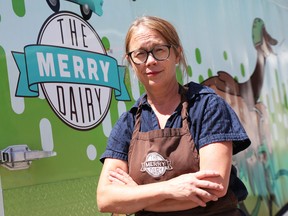The rules are not about security, they are about giving the biggest players control of the market at the expense of consumer choice.

.
I love ice cream and recently learned how to make it at home so I can use natural ingredients and unique flavor combinations that can’t be found anywhere else.
Announcement 2
.
It was only a few months ago that I noticed that the frozen section of the grocery store seems to be loaded with a variety of options, but upon closer inspection, most of those products come from the four big players in the Canadian food industry. ice cream: Unilever, David Chapman’s Ice Cream Limited, Agropur Dairy Cooperative and Nestlé Canada Inc. Only two of these are Canadian companies.
Recently, a local ice cream producer, Merry Dairy, was forced to close its wholesale distribution operations by an official from the Ontario Ministry of Agriculture, Food and Rural Affairs (OMAFRA). Otherwise, owner Marlene Harley would face fines of $1,000 a day. Before long, she had to coordinate the logistics of getting hundreds of pints of ice cream out of local stores.
Announcement 3
.
Last year, Pascale’s Ice Cream, another Ottawa-area ice cream maker and “Ottawa’s ice cream queen” according to Laura Robin of the Ottawa Citizen, had the same problem. Owner Pascale Berthiaume had to get all of her ice cream out of the 15 stores she sold to, including one of hers literally across the street from hers.
In both cases, they can sell their milk ice cream in their own stores (retail and online), but if they cross the street to sell it in another store or that store sells it on their own website, they are breaking the law. Apparently moving products from one freezer to another makes them unsafe to sell.
The Ontario Milk Act, enacted and passed in 1965, allows ice cream makers to sell their product directly to consumers, but prevents them from selling wholesale (retail and online) to other businesses unless they hold a license. dairy plant. Upgrading their production facilities to meet the requirements of this license could cost them hundreds of thousands of dollars.
Announcement 4
.
In a recent CBC story, an OMAFRA spokesperson said the requirement to be licensed under the Milk Act is about ensuring that companies that distribute dairy products meet the province’s “high food safety standards.”
It’s not about security, it’s about giving the biggest players control of this industry at the expense of consumer choice. As a result, our options in grocery freezers are very simple, while truly artisanal, single-flavor, small-batch businesses continue to face ridiculous red tape and an inability to scale.
During the pandemic we saw flexibility in many sectors, for example liquor rules changed to help businesses stay afloat by allowing alcohol to be sold through different channels like UberEats. Why can’t dairy rules display the same level of flexibility and intelligence? If the bureaucrats could see past their noses, they would see this as a triple win. Milk ice cream sales would increase, dairy farmers would have more business, and consumers would have more choice.
It’s time for local MPPs to advocate to bring the Ontario Milk Law into this century and help Ontario’s real small businesses grow. Less vanilla, more passion fruit, please.

